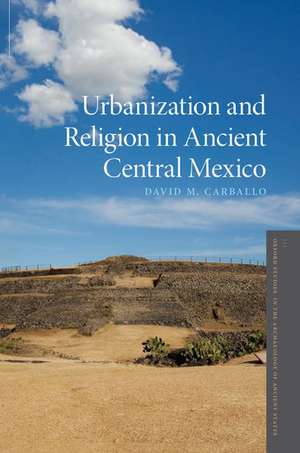Urbanization and Religion in Ancient Central Mexico: Oxford Studies in the Archaeology of Ancient States
Autor David M. Carballoen Limba Engleză Hardback – 5 noi 2015
| Toate formatele și edițiile | Preț | Express |
|---|---|---|
| Paperback (1) | 253.25 lei 31-37 zile | |
| Oxford University Press – 7 iun 2018 | 253.25 lei 31-37 zile | |
| Hardback (1) | 520.81 lei 31-37 zile | |
| Oxford University Press – 5 noi 2015 | 520.81 lei 31-37 zile |
Preț: 520.81 lei
Preț vechi: 705.00 lei
-26% Nou
Puncte Express: 781
Preț estimativ în valută:
99.68€ • 102.73$ • 84.16£
99.68€ • 102.73$ • 84.16£
Carte tipărită la comandă
Livrare economică 19-25 februarie
Preluare comenzi: 021 569.72.76
Specificații
ISBN-13: 9780190251062
ISBN-10: 0190251069
Pagini: 296
Ilustrații: 55
Dimensiuni: 165 x 241 x 23 mm
Greutate: 0.43 kg
Editura: Oxford University Press
Colecția OUP USA
Seria Oxford Studies in the Archaeology of Ancient States
Locul publicării:New York, United States
ISBN-10: 0190251069
Pagini: 296
Ilustrații: 55
Dimensiuni: 165 x 241 x 23 mm
Greutate: 0.43 kg
Editura: Oxford University Press
Colecția OUP USA
Seria Oxford Studies in the Archaeology of Ancient States
Locul publicării:New York, United States
Recenzii
Researchers and students will find a solid book with carefully presented empirical case studies and an innovative theoretical perspective on key intellectual problems, such as urbanism, the formation of settlements and cities, and the organizational potential and unique materiality of cultural belief systems. The writing is precise and unpretentious. The photographs, illustrations, graphs, and maps are informative and well designed. Urbanization and Religion is also not an incredibly long book and, with Carballo's clear prose, will make an excellent assigned book for both undergraduate and graduate classes.
In a study that is as concise as it is illuminating, David Carballo takes us through a tour of Central Mexico urbanism in the late Formative Period (roughly from ca. 600 BCE to 100 CE), building on extensive scholarship as well as his own archaeological research. The analysis hinges on the connections between ancient urbanization and religion, brought to life through the methodological choice of combining archaeology with religious studies.
David Carballo has bootstrapped fresh theoretical constructs with an innovative approach to prehispanic central Mexican religious traditions ... The overarching approach (and findings) provoke new investigatory questions for prehispanic Mesoamerican studies and beyond ... through the application of a novel frame that interweaves the general and specific, while also establishing conceptual bridges across the social and historical sciences, the author has advanced a means to interpret the deep past, which, if broadly applied, could help provide a firmer foundation to assess key questions relevant to the present and the future.
An outstanding archaeological synthesis and an interpretive innovation like none other in recent years. Rather than playing it safe by keeping materiality and religion at arms' length, he illuminates through painstaking research and insightful analysis how the 'cultural logic guiding human action' of Mesoamerican urbanization is permeated by religious practices and ideas. Carballo gives new life to knowledge of Mexico's ancient cities.
This is an excellent synthesis of the earliest cycles of urbanization in central Mexico, showing religion always entangled with politics. Later polities changed in some ways, but much endured into Aztec times. It fills a major gap in our understanding of the history of a key region in Mesoamerica.
In a study that is as concise as it is illuminating, David Carballo takes us through a tour of Central Mexico urbanism in the late Formative Period (roughly from ca. 600 BCE to 100 CE), building on extensive scholarship as well as his own archaeological research. The analysis hinges on the connections between ancient urbanization and religion, brought to life through the methodological choice of combining archaeology with religious studies.
David Carballo has bootstrapped fresh theoretical constructs with an innovative approach to prehispanic central Mexican religious traditions ... The overarching approach (and findings) provoke new investigatory questions for prehispanic Mesoamerican studies and beyond ... through the application of a novel frame that interweaves the general and specific, while also establishing conceptual bridges across the social and historical sciences, the author has advanced a means to interpret the deep past, which, if broadly applied, could help provide a firmer foundation to assess key questions relevant to the present and the future.
An outstanding archaeological synthesis and an interpretive innovation like none other in recent years. Rather than playing it safe by keeping materiality and religion at arms' length, he illuminates through painstaking research and insightful analysis how the 'cultural logic guiding human action' of Mesoamerican urbanization is permeated by religious practices and ideas. Carballo gives new life to knowledge of Mexico's ancient cities.
This is an excellent synthesis of the earliest cycles of urbanization in central Mexico, showing religion always entangled with politics. Later polities changed in some ways, but much endured into Aztec times. It fills a major gap in our understanding of the history of a key region in Mesoamerica.
Notă biografică
David M. Carballo is Assistant Professor of Archaeology at Boston University.


















